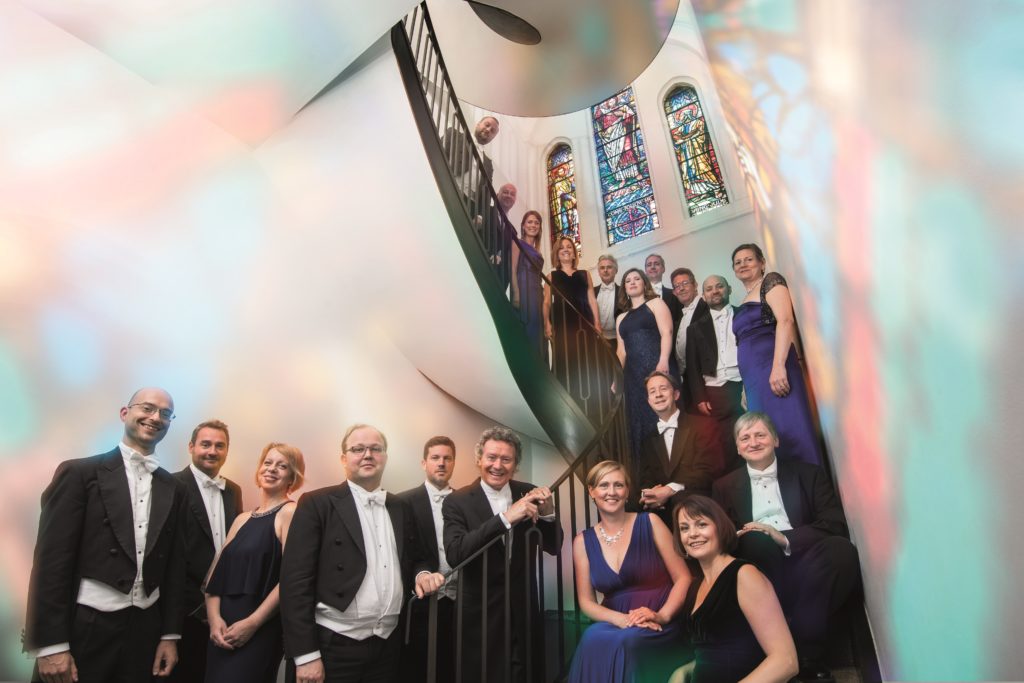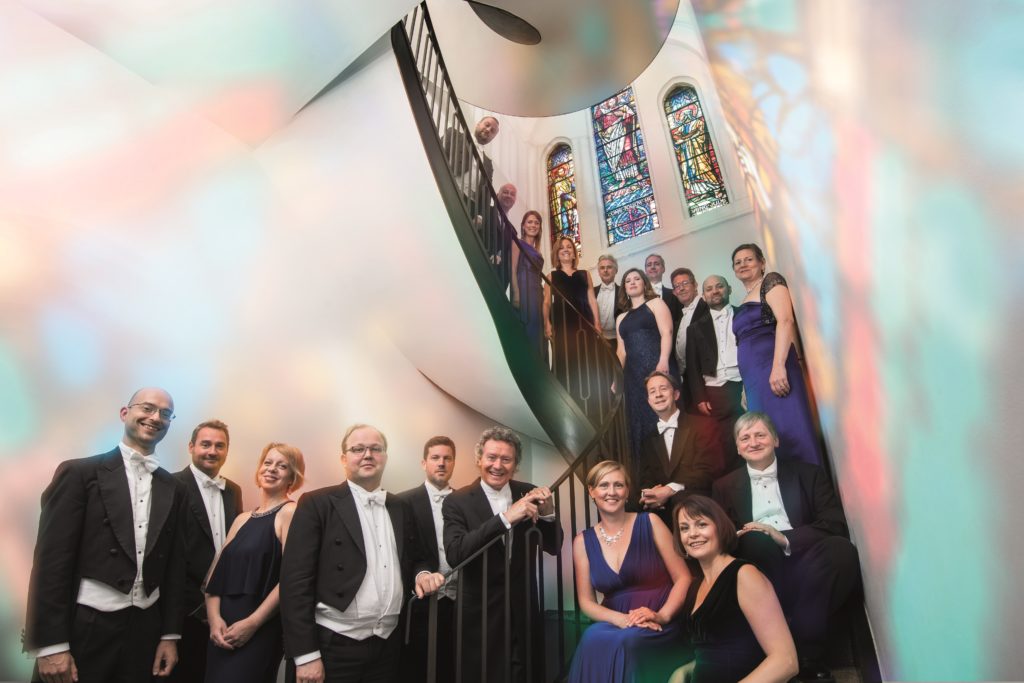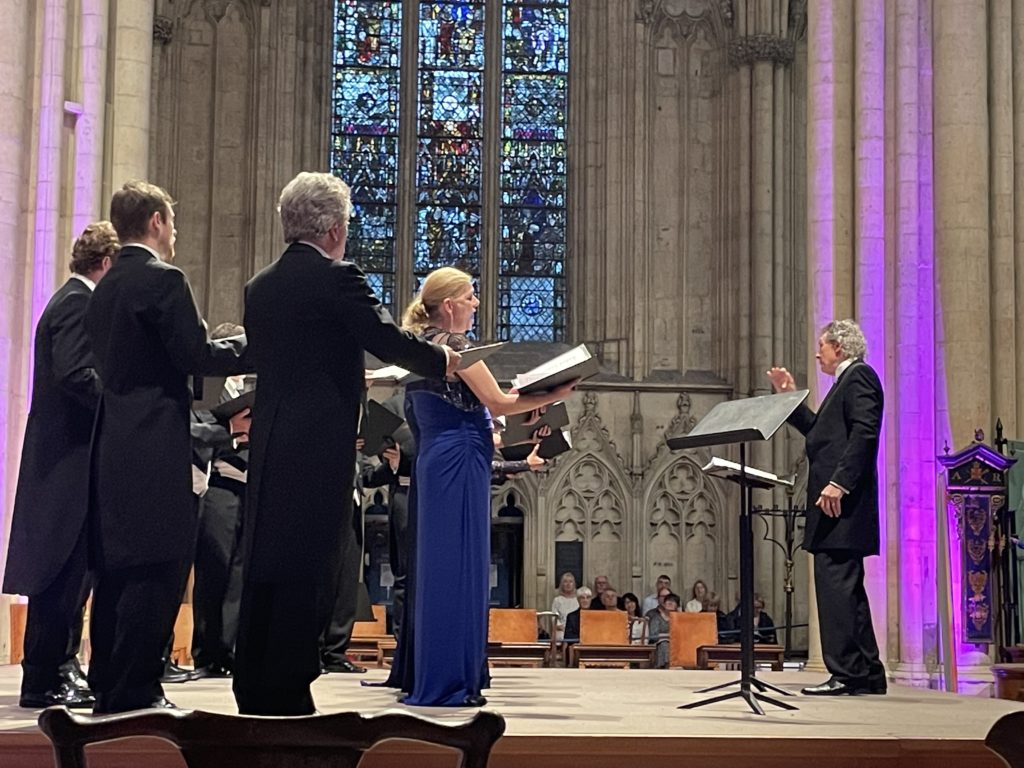
A SURPRISE introduction: as per usual the concert was prefaced by a clerical welcome plus loo, safety and mobile phone instruction. This closed with a prayer, which I thought was a bit of a no-no. But then I got the (possible) subtext: England were to embark on a penalty shoot-out. And it worked; we won!
The Sixteen’s Masters Of Imitation celebrates the art of parody in renaissance music, focusing on the works of Orlande de Lassus to link this inspired programme together.
Today we are very used to the term ‘parody’ meaning to imitate, to exaggerate the style of a particular writer or artist but to comic effect. Here Lassus’s parody works are akin to creating a musical patchwork quilt: taking musical bits, passages from his own historic compositions or his great predecessor Josquin des Prez, for example, and reworking the material into an entirely new composition. This latter process being a dedicated act of homage.
The concert opened with the timeless beauty of the plainchant Lauda Jerusalem Dominum. It was performed as a processional with the tenor calls answered with soprano responses. There is invariably a deep simplicity of beauty in these non-metric, homophonic lines and this, being The Sixteen, was no exception.
Lassus’s reworking of the plainchant (it has the same text) was a thing of beauty. Here melodies rising high into the air, the singing just glorious. But there was also a sense of fun, of joy as the music rhythmically danced. And word painting too. I think it was this sense of warmth, of Lassus’s humanity that was communicated so effectively.
Lassus’s motet Osculetur Me Osculo Oris sui is scored for two choirs and the composer exploits the different sonorities to dramatic effect, such as Trahe Me Post Te. I was reminded of the music of the Gabrielis, but doubt I’m the only one to have made this connection.
And then there was the sensuous setting of some quite juicy texts:
“Let him kiss me with the kiss of his mouth;
for thy love is better than wine
Thy name is as oil poured out;
therefore the young maidens have loved thee.”
Be rest assured, the Latin text gives these lines a “cloak of decency” (Bob Dylan).
To be honest, I had never heard of Maddalena Casulana. According to a leading authority in these matters, Wikipedia tells us “she was an Italian composer, lutenist and singer of the late Renaissance. [Casulana] is the first female composer to have had a whole book of her music printed and published in the history of western music, dedicated to her female patron Isabella de Medici”.
Her pretty radical dedication reads: “These first fruits of mine, flawed as they are … show the world the futile error of men, who believe themselves patrons of the high gifts of intellect, which according to them cannot also be held in the same way by women.”
Of the two madrigals I found the second much more rewarding. The choir was reduced by half, which added some welcome relief from conductor Harry Christophers’ insistence on performing the programme with a full complement of singers. Greater clarity of line and text massively enhanced enjoyment. This love song was a real gem.
It is perhaps worth noting that this rediscovery and promotion of Maddalena Casulana’s music –this may be the first time these works have been committed to a CD recording, Masters Of Imitation, available at all good record shops near you – is clearly significant.
In The Sixteen’s 2023 Choral Pilgrimage, Harry Christophers programmed the world premiere of two commissioned works by female composer Dobrinka Tabakova.
I struggled with Lassus’s eight-part Credo from his Missa Osculetur Me. There was just so much wonderful contrapuntal detail unable to escape from the Minster acoustic black hole. At times passages hung in the air, just a haze of sound, albeit a beautifully sung one. And yes, the closing coming together and Amen final cadence was delicious.
Jean Guyot de Châtelet’s arrangement of Josquin, adding six extra parts to Benedicta es Caelorum Regina, was thrilling, if somewhat eccentric. There were juicy false relations and a spine-tingling Amen. This is original music composition and performance of the highest order.
Other memorable highlights included Josquin Desprez’s Benedicta es Caelorum Regina with its exquisite tenor opening, its slightly whacky atmosphere of splendour and its forceful, dramatic descending scales prosecuting the message-with-a-twist:
“The Word became flesh from you,
by whom all are saved.”
Lassus’s Magnificat Benedicta es Caelorum Regina was another, with its clear contrapuntal lines and exciting antiphonal exchanges that seemed to dissolve or evaporate, allowing the light to shine.
Although there is no doubting the brilliance of Bob Chilcott’s choral music – surely every choir in the UK worth its salt must have Chilcott in its repertoire – his music just doesn’t “turn me on” (John Lennon). But this specially commissioned sacred parody of Lassus’s secular madrigal, Lauda Jerusalem Dominum, undoubtedly called for a personal rethink.
The setting was pretty conservative – no surprises here, Chilcott is a pretty conservative composer. But there were truly magical moments. For example, the delicate ostinato soprano patterns, beautiful on their own terms, then as a gorgeous backdrop for the soaring melodies.
I would have liked greater contrasts in scoring and dynamic, but the rich tonal harmonic identity, distinctive variations in colour and ending delivered a tasty punch. The performance was of the usual exemplary quality; instinctive melodic shaping, expression and care for detail. And so musical.
The concert as a whole showed yet again Harry Christopher and The Sixteen’s deep understanding of repertory and, just as importantly, communicated an infectious engagement in the music itself. The audience response was both instinctive and rapturous.
They really are a class act.
Review by Steve Crowther


